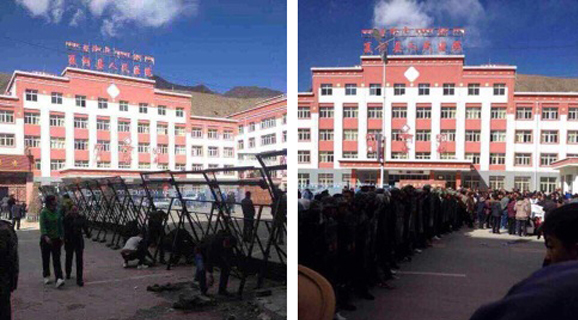Two Tibetan demonstrations in northern Tibet over fair land compensation, education policies

Police erect barricades and face off against demonstrators near Labrang monastery
- Images emerged from Sangchu (Chinese: Xiahe) yesterday showing a large deployment of armed police in response to a group of Tibetans, possibly including Chinese, who sought to peacefully raise their concerns over unfair compensation for land in their home areas, according to information from Tibetan sources. Footage of the protest showed Tibetans apparently reclaiming their banner from police with riot shields and helmets, amid a noisy confrontation that also showed police wielding clubs against unarmed Tibetans.
- Footage also circulated on social media from Tibet of Tibetan middle school students in Dzoege (Chinese: Ruo’ergai), Ngaba, calling for equality in education on November 1 after an official meeting was held about bilingual education and other policies in the prefecture.
For details on both protests, see our report.
Top Chinese official in Tibet threatens to severely punish Tibetan cadres who support the Dalai Lama
Chen Quanguo, the Tibet Autonomous Region Party Secretary, has had statements published in Global Times and in Tibet Daily threateningly Tibetans who support His Holiness the Dalai Lama. He is quoted saying that “as for cadres who harbor fantasies about the 14th Dalai Group, follow the Dalai Group, participate in supporting separatist infiltration sabotage activities, (they will be) strictly and severely punished according to the law and party disciplinary measures.” These statements come on the heels of new regulations in some parts of Tibet which explicitly exclude Tibetans who ‘secretly’ hold sympathy for the Dalai Lama from participating in village committees, and may be indicative of a deepening crackdown on support for the Dalai Lama in Tibet.
ICT asks German company Bosch for information on its involvement in China Surveillance and Security Fair
The International Campaign for Tibet has called upon German company Bosch to release information about the products it was selling at a major surveillance and security fair, China International Exhibition on Public Safety and Security, in Beijing from October 28 to 31. In a letter to Bosch sent on October 27, 2014, the International Campaign for Tibet asked Bosch CEO Volkmar Denner whether they made a Human Rights Impact Assessment prior to the decision to participate in the Fair. So far ICT has not received a reply.
Official ICT statement on the Shugden demonstrators
The International Campaign for Tibet is dismayed by the demonstrations by some Buddhists in the name of “International Shugden Community” aimed at undermining the work of His Holiness the Dalai Lama.
While we leave it to the learned Buddhists to comment on the validity of the issue, our concern is that these Shugden demonstrators are causing great damage to the broader Tibetan issue. The people of Tibet continue to suffer under a ruthless and brutal Chinese regime. On account of this, the Tibetans in Tibet are even sacrificing their lives calling for the return of His Holiness the Dalai Lama and freedom for Tibet. For more please see our full statement.
Misleading reporting on Tibetans in Nepal
A report issued by Asia News gives a misleading impression on the issue of Tibetan refugees in Nepal. Asia News cited Shes Narayan Poudel, chief of the National Commission for the Coordination of refugees, in Kathmandu saying that: “We have decided to no longer provide identity cards to Tibetan refugees. If we continue to recognize them as such, we will face new waves of immigration. And we have no more space.”
ICT has been able to confirm that there is no change in policy in Nepal with regard to Tibetan status. The agreement with the United Nations High Commission for Refugees on the transit of Tibetan new arrivals through Nepal still holds, although the number of Tibetans escaping into exile has plummeted this year, in the context of a steady decline each year since China’s crackdown in Tibet deepened in 2008. Under pressure from China, Nepal stopped issuing or renewing refugee identification cards in 1994 to the long-staying Tibetan community in Nepal.

